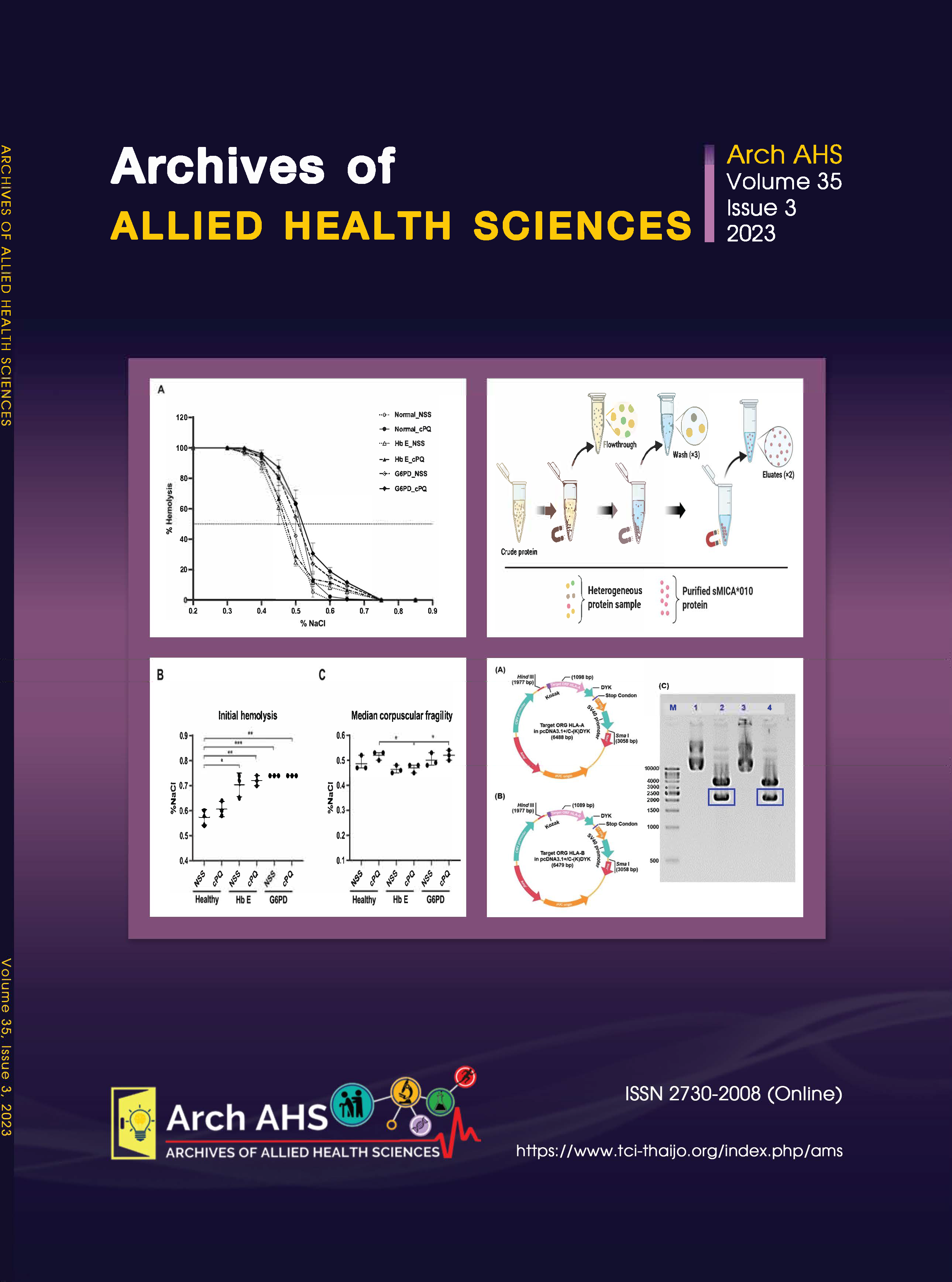Did digital learning during the lockdown impact emotional distress?
Main Article Content
Abstract
Digital learning might have been one helpful strategy for occupational therapy students during the coronavirus pandemic in 2019. This study aimed to assess, before and after the lockdowns, whether digital learning caused any changes or had any impact in terms of the sleep quality, sleep hygiene, and emotional distress experienced by the 1st – 3rd year students during two semesters between 2020 and 2021. The Thai version of the Pittsburgh Sleep Quality Index, Sleep Hygiene Index, and Depression Anxiety Stress Scales were assessed in purposive sampling of 42 students. It was found that sleep hygiene and quality were not significantly different, while depression, anxiety, and stress scores increased significantly in 2021. Even though all students were able to maintain grade point averages, they perceived poor sleep quality and moderate sleep hygiene after the 9-month lockdown. This study suggests that coping strategies with resiliency, mental health well-being, and sleep health management might be an integrated topic for digital learning. In conclusion, the lockdown situation has cultivated a significant uptrend in emotional distress without differences in academic success among the participants.
Article Details

This work is licensed under a Creative Commons Attribution-NonCommercial-NoDerivatives 4.0 International License.
References
Gustafsson L. Occupational therapy has gone online: What will remain beyond COVID-19? Aust Occup Ther J 2020; 67(3): 197-8.
Hollis V, Madill H. Online learning: the potential for occupational therapy education. Occup Ther Int 2006; 13(2): 61-78.
Hwang NK, Shim SH, Cheon HW. Digital learning designs in occupational therapy education: a scoping review. BMC Med Educ 2023; 23(1): 7.
Park CS. Examination of smartphone dependence: functionally and existentially dependent behavior on the smartphone. Comput Hum Behav 2019; 93:123-8.
Shitole BS, Jitta SP, Netikar HM, Panchasara TP. Identifying internet addiction, quality of sleep and stress among undergraduate (UG) occupational therapy (OT) students: a cross sectional study. Indian J Appl Res 2020; 10(4): 84-6.
De Witt P, Monareng L, Abraham A, Koor S, Saber R. Resilience in occupational therapy students. S Afr J Occup Ther 2019; 49(2): 33-41.
Brown T, Yu M-l, Etherington J. Listening and interpersonal communication skills as predictors of resilience in occupational therapy students: a cross-sectional study. Br J Occup Ther 2021; 84(1): 42-53.
Geirdal AO, Nerdrum P, Bonsaksen T. The transition from university to work: what happens to mental health? a longitudinal study. BMC Psychol 2019; 7(1): 1-10.
Chatthong W, Khemthong S, Rueankam M. Relationship between sleep, digital usage and emotional states in Thai occupational therapy students. Asia Pac J Health Manag 2021; 16(4): 116-24.
Sharma A, Tyszka A. Understanding the mental health of occupational therapy students during the COVID-19 pandemic. J Occup Ther Edu 2023; 7(1).
Lovibond SH, Lovibond PF. Manual for the depression anxiety stress scales. 2nd ed. Sydney: Psychology Foundation; 1995.
Sitasuwan T, Bussaratid S, Ruttanaumpawan P, Chotinaiwattarakul W. Reliability and validity of the Thai version of the Pittsburgh sleep quality index. J Med Assoc Thai 2014; 97 (Suppl 3): S57-67.
Mairs L, Mullan B. Self-monitoring vs. implementation intentions: a comparison of behaviour change techniques to improve sleep hygiene and sleep outcomes in students. Int J Behav Med 2015; 22(5): 635-44.
Oei TPS, Sawang S, Goh YW, Mukhtar F. Using the depression anxiety stress scale 21 (DASS-21) across cultures 2013; 48(6): 1018-29.


